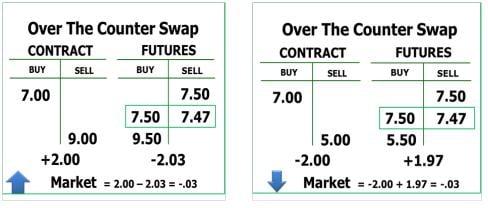The Key to Obtain Financing for Grain Merchandising
The end of summer brings thoughts of planning and profitability. Grain companies that buy grain from producers and sell it immediately to users of...
1 min read
 Jeff Reardon
Aug 12, 2014
Jeff Reardon
Aug 12, 2014

 Volatile prices and the difficulty accessing credit during peak financing periods opened the market to provide commodity futures swaps as a method of grain elevator financing.
Volatile prices and the difficulty accessing credit during peak financing periods opened the market to provide commodity futures swaps as a method of grain elevator financing.
A commodity swap simply eliminates a futures position with the agreement that you will accept the futures position back at a later date. The fee charged will be based on volatility of the underlying commodity and the amount of time spanned by the swap.
For example: On March 15th the elevator has 1 million forward contracted bushels at an average basis of -50December. The December futures are trading at $7.50. The elevator agrees to use 1 million bushels of forward contracts as collateral for the swap and exchanges December futures at $7.50 with the agreement to take the futures back at $7.47. On the banks books, December futures are sold at $7.50 with the agreement to buy them back at $7.47. The elevator is paying the bank a fee of $.03 per bushel and will not have margin call responsibilities for 7 months when the swap is completed. The contract will set the date, cost and early termination pricing.

The elevator pays the fee when the futures are exchanged while spanning time and potential volatility at a fixed price. This product is insurance against a market rally and is typically priced for a $2 to $4 market move.
To learn more about Mark to Market Grain Accounting and the financial implications of futures swaps please sign up below for one of our finance courses.

The end of summer brings thoughts of planning and profitability. Grain companies that buy grain from producers and sell it immediately to users of...

Volatile prices mixed with a need to build working capital and equity pushed inventory repurchase agreements into the grain elevator financing and...

Historical business truths typically come from very simple concepts. “Price is what you pay. Value is what you get” (Warren Buffet). “A penny saved...